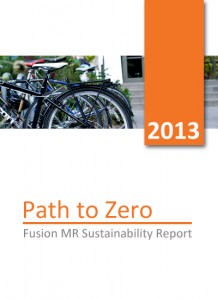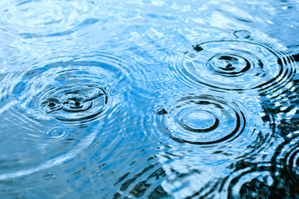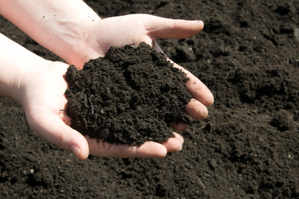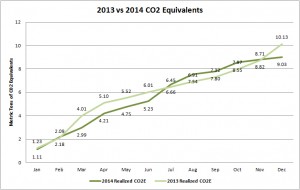In 2012 Fusion MR set the goal to reduce its eco-footprint to zero by 2017. The goal encompasses both business and personal activities. After all, one is not living sustainability if they are at sustainable at work, but not at home, or vice versa.
We chose The Natural Step’s System Conditions as a guide for determining what is sustainable. Then we separated our potential pollution contributions into three categories: Air, Water, and Soil. We developed metrics within each category in order to measure our monthly pollution by type, so we could track progress for the next 5 years. Without metrics it is impossible to know if progress is being made and, ultimately, if or when we reach the goal of zero. (Having said this, we acknowledge several ‘gray’ areas that we plan to improve over time.)
 While we acknowledge that there are many air pollutants besides CO2, many of which are more directly harming to humans today, we know that decreasing and eliminating our CO2 contributions will decrease these other contributions at the same time. Each month we calculate our CO2 equivalents (CO2E) contributions from burning fossil fuels for transportation (car gasoline and airplane jet fuel), home heating and cooking (natural gas), and electricity consumption for lighting & appliance usage. We also track bike commuting to see how many transportation miles are being offset. The graph to the right shows our cumulative 2013 versus our 2014 CO2E. For more information about calculations please see our annual Sustainability Report HERE
While we acknowledge that there are many air pollutants besides CO2, many of which are more directly harming to humans today, we know that decreasing and eliminating our CO2 contributions will decrease these other contributions at the same time. Each month we calculate our CO2 equivalents (CO2E) contributions from burning fossil fuels for transportation (car gasoline and airplane jet fuel), home heating and cooking (natural gas), and electricity consumption for lighting & appliance usage. We also track bike commuting to see how many transportation miles are being offset. The graph to the right shows our cumulative 2013 versus our 2014 CO2E. For more information about calculations please see our annual Sustainability Report HERE
Water pollution includes anything that goes down our drain or off our lawn and driveway. We measure the output by tracking our inputs. What do we put down or drain – sinks, toilets, shower and tub – that causes harm to the environment? (TNS’ System Condition #2 regarding synthetics which do not biodegrade in the environment is our guideline.) To achieve our goal, we will eliminate the use of products that are not biodegradable. We decided this was the most effective way to be in line with our goal, to simply abstain completely from purchasing and using harmful chemicals in and outside our homes.
Pollution to soil includes our contribution to non-recyclable solid waste. To reduce and eliminate these pollutants requires a dedication to not purchasing goods in non-recyclable packaging and only buying long lasting and repairable products. To take it one step further, we are looking upstream and purchasing from environmentally responsible companies. As a metric for this type of waste we measure our outgoing garbage, by the can size. Progress in this area includes buying or growing organic food products, organic cotton clothes, biodegradable cleaners and reducing non-recyclable trash. Today, a small capacity trash barrel is put out for weekly disposal (to the landfill); the next step is bi-weekly pick-ups, then monthly and then … zero stuff to the landfill.
In the summer of 2014 Michael downsized from a 2300sf to 1750sf Energy Star® home. The new home includes well insulated walls and windows, a heat pump HVAC and hot water system, and high efficiency appliances. During the move, several harmful chemicals which had been stored in the garage were taken to Metro Hazardous Waste for safe disposal. In the new home, only biodegradable soaps, shampoos, cleaners, and detergents are purchased and used.

CLEAN AIR
Zero (Carbon) Emissions
- Eliminate burning of gasoline or diesel fuel in transportation, lawn & garden care
- Eliminate burning of natural gas for heat
- Eliminate the purchase of electricity generated from burning fossil fuels (coal, natural gas, oil)
- Increase bicycle commute miles

CLEAN WATER
Zero Synthetics Down the Drain
- Eliminate the purchase of household cleaning products that are not biodegradable
- Purchase organic foods that don’t use pesticides or herbicidesEliminate the purchase of health and beauty products that are not all natural, plant based
- Eliminate the purchase of products that use synthetic compounds which don’t break down in nature
- Support retailers and restaurants that sell fish from sustainably managed fisheries

CLEAN SOIL
Zero Landfill Waste
- Reduce, then eliminate packaging
- Acquire products that are recyclable or biodegradable at the end of its life
- Reduce, then eliminate all single-use item purchases (e.g. packaging)
- Purchase items with very long lives
- Give strong preference in purchase decisions to sustainably-minded organizations (like Patagonia, Nau, Timberland EarthKeepers, New Seasons, Interface/Flor, etc.)
- Purchase from suppliers that have developed closed-loop recycle systems and use organic materials
- Eliminate the acquisition of plastic that is not made from plants (or, at least, recyclable)

